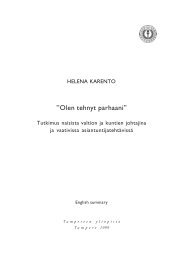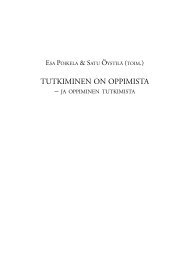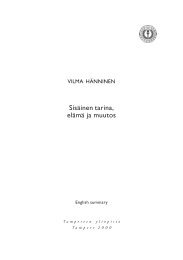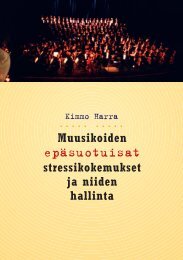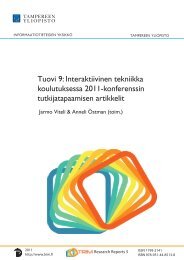Note on this edition: this is an electronic version of the 1999 book ...
Note on this edition: this is an electronic version of the 1999 book ...
Note on this edition: this is an electronic version of the 1999 book ...
Create successful ePaper yourself
Turn your PDF publications into a flip-book with our unique Google optimized e-Paper software.
The Sat<strong>an</strong>ic Verses <strong>an</strong>d <strong>the</strong> Dem<strong>on</strong>ic Text 281<strong>the</strong> text; he <strong>is</strong> a pr<strong>of</strong>essi<strong>on</strong>al writer who does not accept extr<strong>an</strong>eous criteriafor h<strong>is</strong> work, no authority or value higher th<strong>an</strong> <strong>the</strong> spirit <strong>of</strong> inquiry <strong>an</strong>dsceptic<strong>is</strong>m. 98 “A poet’s work,” Baal states: “To name <strong>the</strong> unnameable, topoint at frauds, to take sides, start arguments, shape <strong>the</strong> world <strong>an</strong>d stop itfrom going to sleep.” The narrator adds: “And if rivers <strong>of</strong> blood flow from<strong>the</strong> cuts h<strong>is</strong> verses inflict, <strong>the</strong>n <strong>the</strong>y will nour<strong>is</strong>h him. He <strong>is</strong> <strong>the</strong> satir<strong>is</strong>t,Baal.” 99As <strong>the</strong> reader <strong>is</strong> now aware <strong>of</strong> how m<strong>an</strong>y people have actually lost <strong>the</strong>irlives due to <strong>the</strong> publicati<strong>on</strong> <strong>of</strong> The Sat<strong>an</strong>ic Verses <strong>an</strong>d <strong>the</strong> ensuing clashes,<strong>the</strong>re appears to be something devil<strong>is</strong>h <strong>an</strong>d reckless in <strong>the</strong>se lines. “Baal” <strong>is</strong><strong>an</strong> <strong>an</strong>cient Babyl<strong>on</strong>i<strong>an</strong> appellati<strong>on</strong> <strong>of</strong> “Lord,” implied in <strong>the</strong> devil’s name“Beelzebub,” which has probably originally signified “Baal-zebub,” or “lord<strong>of</strong> flies.” 100 The name <strong>of</strong> <strong>the</strong> poet <strong>is</strong> again <strong>an</strong> indicati<strong>on</strong> <strong>of</strong> <strong>the</strong> m<strong>an</strong>ner inwhich ficti<strong>on</strong> <strong>is</strong> positi<strong>on</strong>ed as dem<strong>on</strong>ic in <strong>the</strong> text itself; <strong>the</strong> later reacti<strong>on</strong>s<strong>an</strong>d dem<strong>on</strong><strong>is</strong>ing attacks <strong>on</strong> Rushdie <strong>an</strong>d h<strong>is</strong> novel have <strong>on</strong>ly been able toc<strong>on</strong>firm <strong>the</strong> oppositi<strong>on</strong>al structure that <strong>is</strong> built into The Sat<strong>an</strong>ic Verses itself.As <strong>the</strong> Jahilia sequences unfold, <strong>th<strong>is</strong></strong> oppositi<strong>on</strong> becomes increasingly aggravated.Baal <strong>is</strong> forced to take flight <strong>an</strong>d hide himself in a bro<strong>the</strong>l. He graduallycomes to real<strong>is</strong>e that “h<strong>is</strong> story was so mixed up with Mahound’s thatsome great resoluti<strong>on</strong> was necessary.” 101 The novel dramat<strong>is</strong>es <strong>the</strong> c<strong>on</strong>flictbetween secular writing (backed up by <strong>the</strong> individuality <strong>of</strong> <strong>the</strong> poet) <strong>an</strong>d <strong>the</strong>sacred text (author<strong>is</strong>ed by God himself) as a power struggle; poetry <strong>is</strong> subjugated<strong>an</strong>d incorporated into <strong>the</strong> dual<strong>is</strong>m built into religious thought. Baal’sway <strong>of</strong> attacking <strong>th<strong>is</strong></strong> power structure <strong>is</strong> <strong>an</strong>alogous to <strong>the</strong> choice <strong>of</strong> <strong>the</strong> immigr<strong>an</strong>tchildren who took <strong>the</strong> dem<strong>on</strong>ic figure <strong>of</strong> Chamcha as <strong>the</strong>ir symbol:inversi<strong>on</strong>, reversal.The logic <strong>an</strong>d structure <strong>of</strong> needs behind <strong>the</strong> producti<strong>on</strong> <strong>of</strong> blasphemyhave not been studied much; <strong>the</strong> expl<strong>an</strong>ati<strong>on</strong>s suggested by The Sat<strong>an</strong>icVerses are as tenable as most. Elaine Pagels wrote in c<strong>on</strong>necti<strong>on</strong> with Sat<strong>an</strong><strong>an</strong>d dem<strong>on</strong><strong>is</strong>ing, how “<strong>the</strong> more intimate <strong>the</strong> c<strong>on</strong>flict, <strong>the</strong> more intense <strong>an</strong>dbitter it becomes.” 102 The narrator in The Sat<strong>an</strong>ic Verses asks “What <strong>is</strong> unforgivable?”<strong>an</strong>d gives <strong>the</strong> following <strong>an</strong>swer: “What if not <strong>the</strong> shivering naked<strong>the</strong>irattacks, but <strong>the</strong> reader could perceive a fixed horiz<strong>on</strong> <strong>of</strong> values, <strong>of</strong> good <strong>an</strong>d evil, at<strong>the</strong> background. Rushdie, however, <strong>is</strong> clearly more situated in <strong>the</strong> traditi<strong>on</strong> <strong>of</strong> ambivalentsatire, <strong>an</strong>alysed by <strong>the</strong> Blooms in <strong>the</strong> prose <strong>an</strong>d poems <strong>of</strong> William Blake, which sometimesmakes it impossible to define some clear “target” for <strong>the</strong> satire. (See Bloom -Bloom 1979, 31, 47, 172, 197.)98 The c<strong>on</strong>necti<strong>on</strong> between authorship <strong>an</strong>d (diabolical) rebelli<strong>on</strong> towards religious authority<strong>is</strong> traditi<strong>on</strong>al; “The Germ<strong>an</strong> mystic Jacob Bœhme, as far back as <strong>the</strong> seventeenthcentury, relates that when Sat<strong>an</strong> was asked to explain <strong>the</strong> cause <strong>of</strong> God’s enmity to him<strong>an</strong>d h<strong>is</strong> c<strong>on</strong>sequent downfall, he replied in justificati<strong>on</strong> <strong>of</strong> h<strong>is</strong> act: ‘I w<strong>an</strong>ted to be <strong>an</strong> author.’Like <strong>the</strong> s<strong>on</strong> <strong>of</strong> m<strong>an</strong>y a good family, he was driven out, he claims, for having hadliterary ambiti<strong>on</strong>s.” (Rudwin 1931/1973, 8.)99 SV, 97.100See, e.g. L<strong>an</strong>gt<strong>on</strong> 1949/1982, 166-67.101 SV, 379.102See above, pages 40-41.



